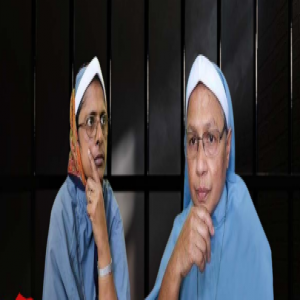

Way back in 2003-04, as part of our formation, we were assigned to work in different social service sectors. I was sent to the Salesian Child Help Line, where they assisted street children at the Bangalore railway station and bus stand. We would roam the platforms, looking for any children in suspicious situations.
It was overwhelming to realise that at least three children we tried to help every day were attempting to run away from home. The kids wouldn't easily give in to our advice. When we were not able to take hold of those children, the railway staff, police, TTE, cleaners, or even vendors came to our aid to catch the children and bring them to the shelter home.
Decades later, the railway station has become an unpleasant place for a nun, especially one dressed in her religious attire. Many eyes appear to be watching us mistrustfully, possibly planning to trap us during our journey. Did Sisters Preeti and Vandana ever think that the railway station, which was very familiar to them, was going to turn hostile against them?
Similarly, for the sister who was travelling from home in Odisha, barely 100 kilometres away, it turned into a battleground where hooligans created chaos for nearly 18 hours. The principal of a nursing college had to face the fury of anti-Christian groups when she had to implement academic discipline on one of her students. These aren't rare occurrences, but frequent and alarmingly increasing.
The velocity of violence against the Christians unfolds the impending danger of death of secularism. The strength of India is in its unity in diversity, and that diversity lets us see each other as another human being rather than Hindu, Christian, Muslim, Sikh, and so on. Vasudhaiva Kutumbakam is our culture, and showing respect to a religious figure is our civilisation.
However, it came as a massive blot on the secular fabric of India when fanatics surrounded two nuns and the tribal youth they were accompanying with intentions most cruel. The TTE found it more legal to call for the aid of the Bajrang Dal than the Railway police to take in custody those women who were travelling without platform tickets! Salute to his duty-mindedness.
And then it was the turn of the self-declared guardians of Bharat. In the pursuit of saving Bharat, they forgot to see the vulnerable group sitting before them; they could see only two human traffickers and a young boy, perhaps the agent! If nuns are traffickers, how could anyone send their child to a convent school?
The United Forum of Christians has reported 379 incidents of attacks on Christians in India in 2025 so far. While some incidents draw the attention of the media and the church, many incidents, including brutal physical attacks, go unreported. While the negative impact of Christian groups on society is unclear, their contributions to nation-building are evident to those who are willing to see.
The attack on nuns has raised many issues, including their dress code. Even though one needs to be prudent when the socio-political scenario is not favourable, yielding to extremist forces contravenes fundamental rights. Nuns in religious habits have been there in India for decades. The dress carries an identity, a meaning to it; it has a witness value. That dress is not meant for films to make a mockery of nuns, or to brand Christian religious women. It stands for something greater than its face value.
Should the congregations need to give up what they consider to be adding value as a religious? In our formative years, we were told that we are not social workers, nor some pious holy people. We are religious missionaries, so wearing our identity while on a mission is not wrong. Our striving towards religious freedom in the country also entails wearing what is acceptable and making one's own dietary choices.
Providing quality education and comprehensive health care was once primarily the domain of Christian missionaries. The urban society may not need our services as much as it used to, even though admissions in our schools and hospitals suggest otherwise. But, definitely, rural folks need us, and Christian missionary presence is highly felt in rural India.
It is not for making use of their vulnerability, but to help them build their lives, to give kids better education, help youth find a future, comfort families in their struggles, and so on. Aren't government agencies doing it? Yes, of course, and sometimes even the government seeks our aid in handling those projects. So it is not the government that does not know us; it is some fringe elements who do not wish to know us.
As it has always been, the blood of martyrs is the seed of Christianity. We wish and pray that these atrocities against religious minorities become a stepping stone toward restoring the secular fabric of India.